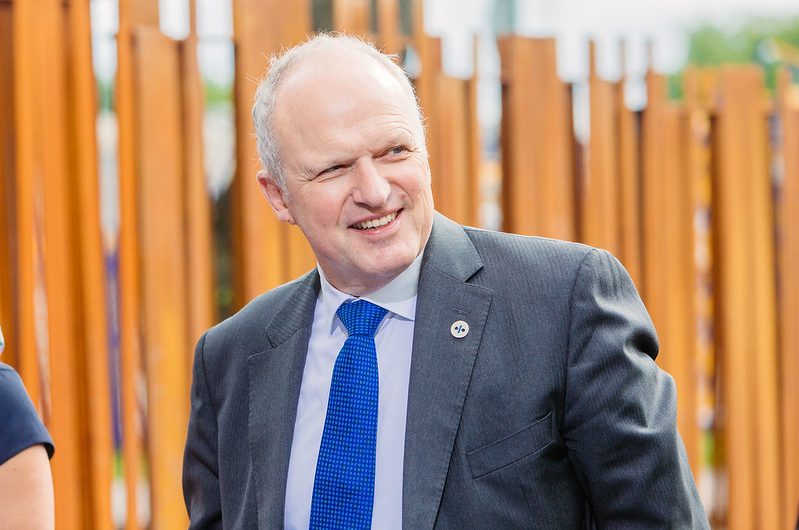
EU2017EE Estonian Presidency via Flickr
AGI Profiles: Dr. Carsten Pillath

Hari Choudhari
Hari Krishan Choudhari is a research intern at AICGS for the fall of 2022. He supports resident fellows with their research projects, manages databases, and helps organize and document AICGS events. Mr. Choudhari is currently pursuing a Bachelor's Degree in International Politics at Georgetown University's Walsh School of Foreign Service, concentrating in Foreign Policy and Policy Processes and minoring in History and German. In his program, he concentrates on transatlantic security and U.S. foreign policy, and his interests include diplomacy, militarism, strategic culture, and South Asia studies.
Mr. Choudhari works concurrently as a Program Assistant and Undergraduate Scholar at the BMW Center for German and European Studies at Georgetown University. Additionally, he has conducted independent research on the Zeitenwende and Germany's changing strategic culture as part of the Laidlaw Scholars Program, which he hopes to continue.
State Secretary in the Ministry of Finance
Dr. Carsten Pillath serves as a State Secretary in the Federal Ministry of Finance, heading Directorate-Generals VII (Financial Market Policy) and E (European Policy and International Financial Policy). Finance Minister Lindner appointed Dr. Pillath in 2022 after a thirteen-year stint in the General Secretariat of the Council of the European Union.
Born in Berlin, Dr. Pillath graduated from secondary school in 1975 with a focus on math and science. After serving in the cadet company of the Guard Battalion of the Federal Ministry of Defense for two years, he studied economics at the University of Cologne from 1977 to 1985. Dr. Pillath remained at the University of Cologne for a further six years, working as a research assistant in the university’s department of public finance for five of those years until receiving a Doctorate in Political Science in 1991.
Government
After graduating from the University of Cologne, Dr. Pillath entered the civil service at the Federal Ministry of Finance, working as a policy officer for federal holdings and the Treuhandanstalt (responsible for privatization in the former East Germany) until 1993. Following a two-year stint as advisor to the German executive director at the International Monetary Fund in Washington, Dr. Pillath returned to the finance ministry as a policy officer in the international and European financial policy divisions until 1998.
A move to the Federal Chancellery followed, as Dr. Pillath headed the division for foreign trade, monetary policy, financial markets, and multilateral organizations from 1998-1999. He then headed the directorates for external economic policy and European policy until 2003, at which point he shifted back to the finance ministry as head of the directorate-general for European policy from 2003-2008. This would be his last position in the German government for thirteen years, as he served as Director-General for economic and social affairs (2008-2012) and for economic affairs and competitiveness (2012-2021) in the General Secretariat of the Council of the European Union, during which time he played an important role in managing the Eurozone crisis. Dr. Pillath received and accepted the offer to work as State Secretary in his old home at the finance ministry in January 2022.
Positions
Dr. Pillath has been billed as Finance Minister Lindner’s right-hand man for European finance and debt on account of his extensive experience in the Council of the EU and strong connections in the heart of Brussels’ economic apparatus. His role will therefore be especially relevant as the European Union debates issuing joint EU-denominated debt to help struggling economies in the wake of the energy crisis, as well as continuing with the COVID-induced relaxation of borrowing limits on member states. Supporting Finance Minister Lindner in both opposing the expansion of debt in EU member states and ensuring that EU Commission borrowing remains a one-off event, Dr. Pillath will have his work cut out for him as he faces pressure from southern EU members and parts of the Commission itself. Moreover, the Finance Ministry will have to contend with Dr. Pillath’s old employers in the Chancellery, as Chancellor Scholz is far more open to possible joint EU debt along the lines of the SURE program than Lindner and the FDP.
Dr. Pillath also plays a key role in representing Germany’s financial interests on the international stage. The 2022 G7 meetings were a prime example, wherein he co-chaired the meetings of the G7 Deputies. His experience in the Sherpa staff during his time at the Chancellery has helped him play an active role in facilitating the expansion of COVID vaccine provision as well as economic cooperation on Ukraine. Given that Germany currently holds the Presidency of the G7, Dr. Pillath is also at the forefront of issues such as financial market regulation, sustainable finance, and handling financial crimes.
Sustainable technology and startup incubation are further priorities in Dr. Pillath’s portfolio. In addition to working on these topics at the EU level and managing Federal Green Bonds, he and Udo Philipp, Minister of State in the economic ministry, supported the KfW (the German state-owned investment and development bank) on VGTF (Venture Tech Growth Financing) 2.0. This measure works to bolster the German venture capital market by providing €1.2 billion from the Zukunftsfond (Future Fund) for joint financing of sustainable tech startups by 2030, with a focus on enabling future jobs growth through working capital financing and business model scaling.
Dr. Pillath will hence act as a key player at the vanguard of the finance ministry’s European financial agenda, spearheading German interests across a wide range of increasingly relevant issues.








